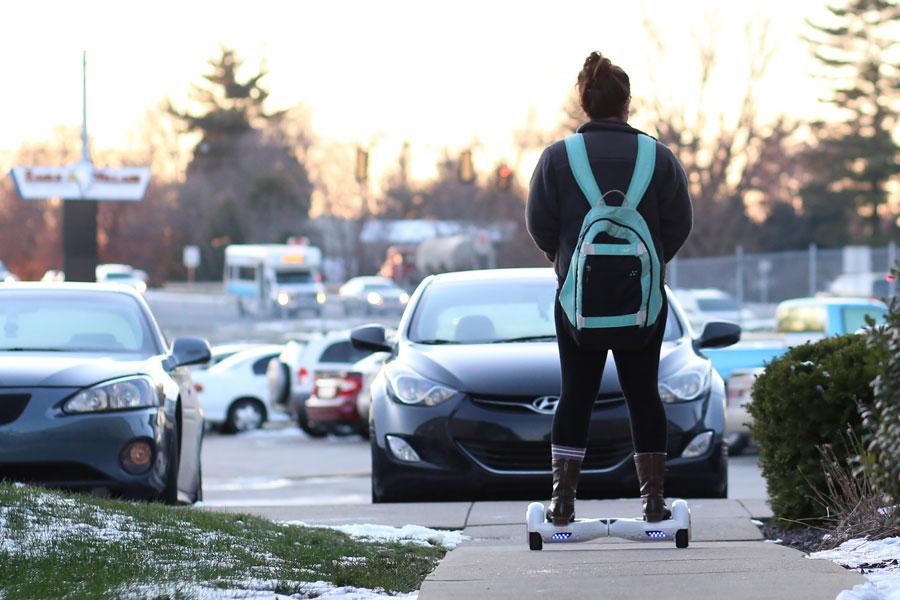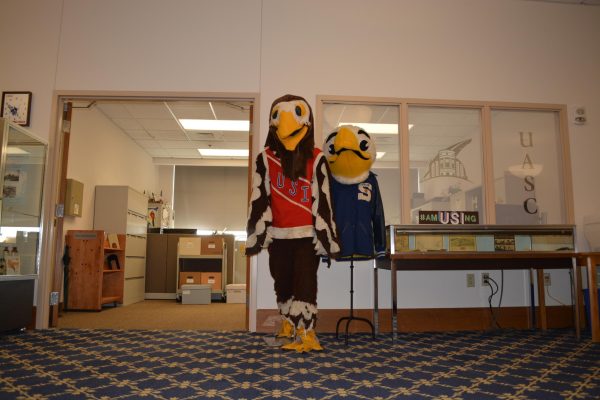Hoverboards banned

Erin Dobson, a junior public relations and advertising major, rides on her hoverboard given to her for Christmas in the parking lot of Eagle Village apartments Tuesday. Dobson just uses hers around her apartment due to the current ban of the scooters on campus.
Dillon Baker isn’t too excited about walking to class.
A few months before the school year began, the freshman business management major got his first hoverboard, a self-balancing, two-wheel motorized board that has been rising in popularity.
“(The university is) trying to take away everything, but I understand,” Baker said. “I wouldn’t want someone else’s gadget to set my stuff on fire. Safety prevails.”
University Relations sent out an email Jan. 7 stating all hoverboards are banned from campus.
Baker said he used the board strictly for transportation purposes, but admitted the board didn’t impact his trek to class much.
“Walking to class was probably an average of six to eight minutes,” he said. “On the board, I would get to class in probably three.”
A rise in reports of hoverboard-related fire incidents prompted the university to make this decision.
“Effective immediately, the university has placed a ban on the use of and storage of hoverboards on all university property, including campus housing,” the email states. “As we are aware that these were popular holiday gift items, we are notifying you to refrain from bringing these to campus with you.”
The email goes on to state that if safety improvements to the contraptions are made, the university will consider revising the ban.
Assistant Vice President for Marketing and Communications Kindra Strupp said anyone found on campus with a hoverboard will be asked to remove the device from the university premises.
USI is not the only university in the state to take action against the hoverboard craze.
Indiana University and Purdue University instituted campus residence hall bans and Butler University and University of Evansville both banned all use of hoverboards.
U.S. Consumer Product Safety Commission Chairman Elliot Kaye released a statement to the U.S. Consumer Product Safety Commission in early December about concerns regarding the safety of hoverboards.
“I have directed agency staff to work non-stop to find the root cause of the fire hazard, how much of a risk it might present and to provide consumers with answers as soon as possible,” the statement read.
Kaye said every consumer deserves to know if there is a safety defect.
“CPSC field investigators are actively investigating hoverboard-related fires across the country and will open new cases as they come to our attention,” Kaye said in the statement. “We have purchased boards in the marketplace and we have taken possession of boards that caught fire.”
According to the statement, fire hazards have generated significant attention and the CPSC has received dozens of reports of injuries from hospital ERs.
Injuries include concussions, fractures, contusions/abrasions and internal organ injuries.
Kaye urged users to take proper precautions such as wearing a proper helmet and padding while using this product. He also cautioned to avoid charging the device overnight if not observing it..
For more tips to avoid accident or injury, visit www.cpsc.gov.
Baker said he thinks that within the next five years, almost 10 percent of students will be using the contraption.
“I feel like the university is scared to change. They always try to find a change in everything… ” Baker said. “The university needs to stop taking our creativity away and let us be free.”
Gabi Wy contributed to this story.










